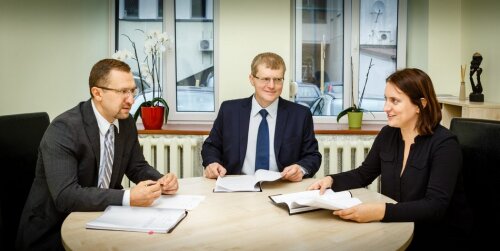Best Employment & Labor Lawyers in Kaunas
Share your needs with us, get contacted by law firms.
Free. Takes 2 min.
List of the best lawyers in Kaunas, Republic of Lithuania
About Employment & Labor Law in Kaunas, Republic of Lithuania
Employment and labor law in Kaunas, like elsewhere in Lithuania, is designed to protect the rights and obligations of both employers and employees. The law sets the framework for hiring, working conditions, payment, termination, and dispute resolution. It ensures fair treatment, non-discrimination, and compliance with national labor standards. Both employees working in the private and public sectors are covered under the national Labor Code and related legislation. In Kaunas, Lithuania's second-largest city, employment law is especially important due to its dynamic business environment and diverse workforce.
Why You May Need a Lawyer
There are many situations in which professional legal advice can be essential when dealing with employment and labor matters in Kaunas. Common scenarios include:
- Unfair dismissal or wrongful termination
- Discrimination or harassment at the workplace
- Disputes over pay, bonuses, or benefits
- Workplace accidents or occupational safety issues
- Drafting or reviewing employment contracts
- Problems arising during business restructuring, mergers, or acquisitions
- Matters concerning collective agreements and union rights
- Disagreements about working hours, leave entitlements, or social guarantees
- Issues related to maternity or parental leave
- Immigration and work permit questions for foreign employees
Seeking advice from a labor law specialist can help protect your rights and guide you through the complex legal process in Lithuania.
Local Laws Overview
The key legal framework governing employment and labor in Kaunas is the Labor Code of the Republic of Lithuania. Here are some important points:
- Employment Contracts: All employment relationships must be formalized with a written agreement specifying position, pay, duties, working hours, and other necessary information.
- Termination Rules: Dismissal must comply with strict rules. Notice periods and severance pay may apply, and dismissals without legal grounds can be challenged in court.
- Non-Discrimination: Employers must treat employees equally and are prohibited from discriminating based on gender, age, disability, religion, nationality, or other factors.
- Working Hours: Standard working time is up to 40 hours per week. Overtime is limited and must be compensated accordingly.
- Leave Entitlements: Employees are entitled to paid annual leave, maternity or paternity leave, and sick leave. The length and conditions are regulated by law.
- Worker Protection: Health and safety standards in the workplace are monitored and enforced. Employers are legally responsible for providing safe working conditions.
- Collective Agreements: Unions and workers can negotiate collective agreements for better terms than those in the Labor Code.
Frequently Asked Questions
What is the standard probation period in Lithuania?
The probation period can be up to three months but may be shorter if agreed upon in writing. During this time, either party can terminate the contract on shorter notice.
Can an employer dismiss an employee without notice?
In most cases, you are entitled to a notice period, unless dismissal is for serious misconduct. Immediate dismissal requires clear, documented reasons.
How is overtime paid in Lithuania?
Overtime is paid at no less than one and a half times your usual pay. Overtime work is generally limited and should be agreed upon by both parties except in emergencies.
Is it mandatory to have a written employment contract?
Yes. Employment in Lithuania must be formalized with a written contract outlining key terms and conditions of employment.
What are the rules regarding annual paid leave?
Employees are entitled to at least 20 business days of paid annual leave per year, with possible extensions for younger employees or those in hazardous roles.
What can I do if I experience workplace discrimination?
You can file a complaint with your employer, the Equal Opportunities Ombudsperson, or seek legal advice to bring a claim before the court.
What social guarantees do employees have?
Employees receive social insurance covering sickness, unemployment, maternity, and pensions, with contributions deducted from their salary.
Are non-Lithuanian citizens protected by Lithuanian labor law?
Yes. All employees working in Lithuania, regardless of citizenship, are covered by the same labor laws, though some immigration formalities may apply.
How are employment disputes resolved?
Most disputes are first addressed internally. If unresolved, parties may seek help from the State Labor Inspectorate or bring the case to the labor courts.
Are trade unions active in Kaunas?
Yes. Trade unions represent workers' interests and may negotiate collective agreements or represent employees in disputes with employers.
Additional Resources
For more information or assistance with employment and labor issues in Kaunas, consider these resources:
- State Labor Inspectorate of the Republic of Lithuania (VDI) - Oversees workplace safety, labor rights, and receives complaints.
- Equal Opportunities Ombudsperson - Protects against discrimination at work.
- Social Security (Sodra) - Administers social insurance for employees.
- Kaunas Labor Exchange - Provides advice on employment and job searches.
- Trade Unions - Various unions offer representation and guidance for employees in specific sectors.
- Legal Aid Services - Free or subsidized legal help for those who qualify.
Next Steps
If you believe your rights have been violated or you need legal advice, here are steps to take:
- Document all relevant events, correspondence, and contracts.
- Try to resolve the issue internally by speaking with your employer or HR department.
- If unresolved, contact relevant governmental bodies such as the State Labor Inspectorate or the Equal Opportunities Ombudsperson.
- Consider reaching out to a trade union if you are a member.
- If you require legal advice, consult with a qualified employment and labor lawyer in Kaunas who understands local and national regulations.
- Seek legal aid if you meet eligibility criteria for free or reduced-cost representation.
Taking prompt action and seeking professional guidance can help you protect your interests and reach an effective resolution.
Lawzana helps you find the best lawyers and law firms in Kaunas through a curated and pre-screened list of qualified legal professionals. Our platform offers rankings and detailed profiles of attorneys and law firms, allowing you to compare based on practice areas, including Employment & Labor, experience, and client feedback.
Each profile includes a description of the firm's areas of practice, client reviews, team members and partners, year of establishment, spoken languages, office locations, contact information, social media presence, and any published articles or resources. Most firms on our platform speak English and are experienced in both local and international legal matters.
Get a quote from top-rated law firms in Kaunas, Republic of Lithuania — quickly, securely, and without unnecessary hassle.
Disclaimer:
The information provided on this page is for general informational purposes only and does not constitute legal advice. While we strive to ensure the accuracy and relevance of the content, legal information may change over time, and interpretations of the law can vary. You should always consult with a qualified legal professional for advice specific to your situation.
We disclaim all liability for actions taken or not taken based on the content of this page. If you believe any information is incorrect or outdated, please contact us, and we will review and update it where appropriate.
Browse employment & labor law firms by service in Kaunas, Republic of Lithuania
Kaunas, Republic of Lithuania Attorneys in related practice areas.
















